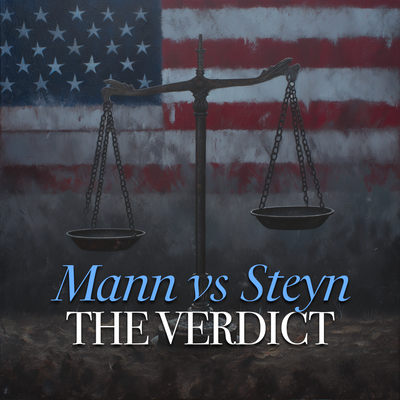As many of you already know, a Washington, DC jury today found the Defendants (Mark Steyn and Rand Simberg) liable for defamatory speech and reckless disregard of provable facts. Putting aside the monetary damages, the real damage done by this case is to every American who still believes in the First Amendment.
The precedent set today, and as alluded to by Justice Alito when the case was petitioned before the U.S. Supreme Court, means that disagreement and/or criticism of a matter of public policy — the founding principle of this country — is now in doubt. And should you choose to give voice to any dissent, you can brought before a jury, held responsible, and fined.
Think this is just rhetoric? Consider, Mark Steyn is a member of the media. As such, he is supposedly afforded First Amendment protections. If a member of the media is no longer protected, what do you think that means for every day citizens? And it doesn't matter if you are in DC or Montana — anyone can file in the jurisdiction of his or her choosing.
In Justice Alito's dissent in 2019, he presciently wrote (emphasis added):
The petition in this case presents questions that go to the very heart of the constitutional guarantee of freedom of speech and freedom of the press: the protection afforded to journalists and others who use harsh language in criticizing opposing advocacy on one of the most important public issues of the day. If the Court is serious about protecting freedom of expression, we should grant review...
The petition now before us presents two questions: (1) whether a court or jury must determine if a factual connotation is "provably false" and (2) whether the First Amendment permits defamation liability for expressing a subjective opinion about a matter of scientific or political controversy. Both questions merit our review...
This question — whether the courts or juries should decide whether an allegedly defamatory statement can be shown to be untrue — is delicate and sensitive and has serious implications for the right to freedom of expression. And two factors make the question especially important in the present case...
First, the question that the jury will apparently be asked to decide—whether petitioners' assertions about Mann's use of scientific data can be shown to be factually false — is highly technical. Whether an academic's use and presentation of data falls within the range deemed reasonable by those in the field is not an easy matter for lay jurors to assess...
Second, the controversial nature of the whole subject of climate change exacerbates the risk that the jurors' determination will be colored by their preconceptions on the matter. When allegedly defamatory speech concerns a political or social issue that arouses intense feelings, selecting an impartial jury presents special difficulties. And when, as is often the case, allegedly defamatory speech is disseminated nationally, a plaintiff may be able to bring suit in whichever jurisdiction seems likely to have the highest percentage of jurors who are sympathetic to the plaintiff 's point of view...
The second question may be even more important. The constitutional guarantee of freedom of expression serves many purposes, but its most important role is protection of robust and uninhibited debate on important political and social issues... If citizens cannot speak freely and without fear about the most important issues of the day, real self government is not possible. To ensure that our democracy is preserved and is permitted to flourish, this Court must closely scrutinize any restrictions on the statements that can be made on important public policy issues. Otherwise, such restrictions can easily be used to silence the expression of unpopular views...
In recent years, the Court has made a point of vigilantly enforcing the Free Speech Clause even when the speech at issue made no great contribution to public debate... In United States v. Alvarez, 567 U. S. 709 (2012), the Court held that the First Amendment protected a man's false claim that he had won the Congressional Medal of Honor. In Snyder, the successful party had viciously denigrated a deceased soldier outside a church during his funeral...
Climate change has staked a place at the very center of this Nation's public discourse. Politicians, journalists, academics, and ordinary Americans discuss and debate various aspects of climate change daily — its causes, extent, urgency, consequences, and the appropriate policies for addressing it. The core purpose of the constitutional protection of freedom of expression is to ensure that all opinions on such issues have a chance to be heard and considered. I do not suggest that speech that touches on an important and controversial issue is always immune from challenge under state defamation law, and I express no opinion on whether the speech at issue in this case is or is not entitled to First Amendment protection. But the standard to be applied in a case like this is immensely important. Political debate frequently involves claims and counterclaims about the validity of academic studies, and today it is something of an understatement to say that our public discourse is often "uninhibited, robust, and wide-open.
The full dissent is worth the read and can be found here.
As you might imagine, the last four weeks... nay, the last 12 years... have been exhausting for Mark. But he is grateful for all your notes of support and for your prayers. He'll be back on air in the near future. In the meantime, thank you all.
As always, those wishing to support Mark can do so by taking out a membership in The Mark Steyn Club or purchasing a SteynOnline gift certificate.

